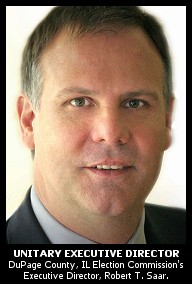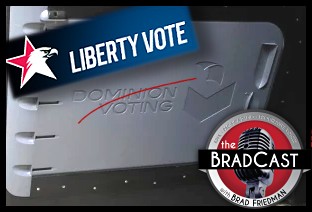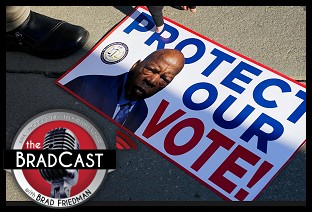Guest blogged by Jean Kaczmarek, co-chair, Illinois Ballot Integrity Project/DuPage Chapter
 On Tuesday, Illinois Ballot Integrity Project (IBIP)/DuPage Chapter celebrated a crucial legislative victory, which will finally force the DuPage County Election Commission to comply with the law before shredding OUR election records.
On Tuesday, Illinois Ballot Integrity Project (IBIP)/DuPage Chapter celebrated a crucial legislative victory, which will finally force the DuPage County Election Commission to comply with the law before shredding OUR election records.
HB 4051 passed unanimously [PDF] in the Illinois Senate 57-0, finally ending a three-year power struggle regarding the Election Commission's destruction of OUR public records. Last month, the bill also passed unanimously [PDF] in the Illinois House 117-0. Illinois Governor Pat Quinn is expected to sign the bill into law shortly.
This short, but significant one-page bill, sponsored by IL Rep. Paul Froehlich (D-56th), amends the Illinois Election Code to specify that the destruction of OUR election-related public records must follow the procedures mandated by the Local Records Act. The bill also amends the Local Records Act to specifically include that local election authorities must comply with the provisions of the Act when disposing OUR public records.
HB4051's provisions have just one county board in mind: the inveterate scofflaws of the DuPage County Election Commission...
This legislation is necessary overkill. The Local Records Act, enacted in 1985, simply and clearly mandated all government entities within the state to comply with certain procedures prior to destroying OUR public records. The DuPage County Election Commission argued that the Illinois Election Code allowed them to destroy OUR public records, and that the Code superseded the Local Records Act. In over two decades, the Election Commission never complied with the Act.
Meanwhile, other election boards across the state saw no ambiguity and had been regularly complying with the Local Records Act for years, including the Cook County and Chicago election boards.
The more-than-three-year odyssey, leading to the necessity of the new bill, began in January 2006 when IBIP/DuPage had learned at a board meeting that OUR records were about to be destroyed. One of our members suggested we contact the Illinois State Archives to find out if the Election Commission was following proper procedure. We discovered that the Election Commission had never filed for a disposal certificate since the Local Records Act had been enacted requiring such a certificate. Unless the Election Commission had a very large storage room somewhere, capable of secretly storing 20+ years of records, they were in violation of the law. Multiple payments Accurate Document Destruction, Inc., suggested that OUR public records were very likely being destroyed.
Destroying OUR records in Illinois, without complying with the Local Records Act, is a Class 4 felony.
 Further, we had strong reason to believe that the Election Commission was destroying OUR election materials prematurely because of contradictory Freedom of Information Act (FOIA) responses. In November 2004, Bev Harris of BlackBoxVoting.org, had FOIAed all jurisdictions nationwide for certain election materials the night of the general election. DuPage County Election Commission Executive Director Robert T. Saar did not respond to the FOIA. Per our request, Harris requested Saar to respond to her original FOIA several months later. Saar finally responded to Harris in March 2005, "...we no longer have the poll tapes being requested there, which are retained statutorily for 60 days following an election."
Further, we had strong reason to believe that the Election Commission was destroying OUR election materials prematurely because of contradictory Freedom of Information Act (FOIA) responses. In November 2004, Bev Harris of BlackBoxVoting.org, had FOIAed all jurisdictions nationwide for certain election materials the night of the general election. DuPage County Election Commission Executive Director Robert T. Saar did not respond to the FOIA. Per our request, Harris requested Saar to respond to her original FOIA several months later. Saar finally responded to Harris in March 2005, "...we no longer have the poll tapes being requested there, which are retained statutorily for 60 days following an election."
Harris would later refer to DuPage County as one of the two "worst places to vote in America," tied with the notorious Riverside County, CA (as The BRAD BLOG has been documenting for years).
Federal and state election codes mandate that OUR records from a federal election be retained for a minimum of 22 months; Saar's response to Harris was just five months after the election. In addition, Harris had presented the FOIA on Election Night --- well within Saar's personal "60-day deadline" for preserving records. Payments to Accurate Document Destruction for disposal of large quantities of materials in January 2005, correlate with Saar's response to Harris. If what Saar stated was true, he and the Election Commission were in violation of federal and state election codes and the Local Records Act.
My IBIP/DuPage co-chair, Melisa Urda and I followed up with our own FOIA request several months later. This time, Saar responded that OUR poll tapes/results slips were "sealed" and "exempt from disclosure." It still remains a mystery as to which one of Saar's stories, if either of them, is true.
Learning six months later that the Election Commission had never complied with the Local Records Act prompted us to alert the Illinois Attorney General's office, who forwarded our complaint to DuPage County State's Attorney Joe Birkett, self-dubbed as the "Corruption Buster". We also paid a courtesy call to the media.
Within several months, the Chicago Tribune published a solid piece [PDF] which concluded with a quote from Saar claiming: "A lot of people are mixing apples and oranges...We don't have to get clearance. The law is very clear about what we can do there. There's no clearance that we have to get from anbody."
The article must have shaken up the State's Attorney's office because they immediately asked to meet with us. Asst. State's Attorney Nancy Wolfe informed us that the Election Commission was not guilty of wrongdoing, as they were only required to follow the Election Code, not the Local Records Act, or even the federal law, in order to destroy OUR records. I asked if their office, or an independent third party, had determined whether or not OUR November 2004 election records still existed. The answer was no, they hadn't bothered to make that determination. I asked if OUR public records, those unrelated to an election, which therefore would not fall under the so-called "perimeters" of the Election Code, had been destroyed. There was no answer.
We regrouped. In June of 2006, I requested the Local Records Commission of Illinois to seek an opinion from Illinois Attorney Lisa Madigan. The Records Commission was absolutely certain that the DuPage County Election Commission needed to comply with the Local Records Act, and appreciated that we were dealing with cruel and unusual circumstances. Formality was necessary to ensure compliance with the law.
Also that month, I sent a letter to DuPage Chief Judge Ann Jorgensen with copies of letters from the Illinois State Archives and Local Records Commission of Illinois regarding the destruction; she acknowledged short and sweet. I hoped that Jorgensen would serve as an insurance policy to protect OUR records. I was wrong. The Election Commission defiantly revved up the shredder, more payments were made to Accurate Document Destruction.
I must have called 50 law firms and agencies that summer seeking pro bono legal assistance, all to no avail. Most people have at least one fear --- heights, elevators, snakes, spiders, etc. Mine is courtrooms. I have nightmares of being chewed out by a cranky old judge. Filing pro se was out of the question. Besides, I knew that I'd be up against a team of taxpayer-paid attorneys well-versed in the hideously burdensome Illinois Election Code, with maybe a Diebold attorney or two thrown into the mix --- all determined to keep OUR electoral process anything but open.
Adding insult to injury, Melisa and I learned that huge plastic bins, picked up for destruction, were, until the fall of 2006, stored at United Express Systems in Aurora. This warehouse was owned by Brad Westrom, brother of the former chairman of the Election Commission, Dean Westrom. Brad and Dean's sister, Jan Westrom, was the warehouse's general manager. OUR public records, which had been denied to citizens in 2005, had been in the custody of the chairman's brother and sister. Those who follow issues of election integrity understand the sanctity of chain of custody. Several years earlier, the Hired Truck Scandal, involving the use of hired, private vehicles to do government work, had rocked Democratic Cook County. When the Westrom warehouse issue in Republican DuPage County was brought to the attention of the authorities and the media...crickets chirped.
In August, I drove to Springfield on a 101-degree day to deliver a public statement to the Local Records Commission of Illinois, to request that they alert authorities that the DuPage County Election Commission appeared to be in violation of the law. Letterhead of a state agency has far more impact than a letter from a few, patriotic suburban moms. The Records Commission complied with my request. Alerting the Illinois Attorney General's office didn't even require a stamp; a staff member hand-delivered it across the street. The DuPage State's Attorney's office was also alerted.
On Sept. 1, 2006, the date before the end of 22-month minimum preservation period for records pertaining to the 2004 general election, Melisa and I presented a cease and desist notice to the Election Commission and sent copies to authorities. We demanded that the destruction stop immediately pending the opinion by the AG's office. This was purely an exercise in futility; we could almost hear the distant Accurate Document Destruction trucks "mobile document shredding units" en route to the Westrom family's warehouse.
The DuPage County Election Commission understood something I didn't --- laws which are never enforced can be easily dismissed. It took a lot more to spook them than notification to authorities. The September 12, 2006 minutes of the Election Commission's board meeting read, "Legal counsel discussed the complaint that the Commission has destroyed records illegally. Legal Counsel recommends that the Commission continue on course..."
Stay the course they did. From the time we first alerted authorities in 2006, to the end of 2007, the Election Commission paid Accurate Document Destruction to dispose of 198 96-gallon toters of material. The Election Commission has refused to disclose the nature of the contents of these toters. Chances are good that you're not tossing out pizza boxes when hiring a professional shredder.
Finally, on December 26, 2007, IBIP/DuPage Chapter received a belated Christmas gift. Illinois Attorney General Lisa Madigan published her opinion [PDF] that the DuPage County Election Commission must comply with the Local Records Act for the procedure of destroying OUR public records.
Madigan's opinion infuriated the Election Commission. "The election commission did nothing wrong from a legal standpoint," DuPage State's Attorney Joe "The Corruption Buster" Birkett told the Daily Herald. "In my opinion, it's case closed."
Saar stated in a public appearance that he strongly disagreed with Madigan's opinion, but that the Election Commission would not destroy more of OUR records until the matter was settled either in court or by legislation. Good as the AG's opinion was, it still wasn't legally binding.
Rep. Paul Froehlich had been closely following our battles with the Election Commission and offered support. The Illinois Election Code can only be amended every other year. 2009 was the year to create a law which essentially says: 'No means no!'
It is fitting to 'honor' our election director by calling HB4051 "The Robert T. Saar Act."
Through it all, the Election Commission board members kept their appointments. The Election Commission's executive staff kept their positions and received annual raises. This July, Saar is set to become the president of the International Association of Clerks, Recorders, Election Officials & Treasurers (IACREOT). From this saga and numerous other alleged wrongdoings (check the latest...), I'm convinced it would take the jaws of life to pry these guys out of there. Ironically enough, the Election Commission's large seal still hangs prominently in its office which reads: "Assuring the Consent of the Governed".
Despite Tuesday's milestone, there's still much work to be done to protect OUR public records. OUR future public records may be preserved, yet we still don't have access to them. Melisa and I jealously monitored the post-election audits conducted by citizens in Ohio which revealed fraud in that state during the 2004 Presidential Election. Such an audit would never be allowed in DuPage County. In addition to the November 2004 poll tapes, we'd like to find out why voter registration fell 84,000 between the primary and general elections in 2004, at a time when voter registration was breaking records nationwide. We'd like to know who had access to the voting machines, software and tabulation room for the November 2004 election, knowing the long, cozy friendships between the Diebold distributor, Fidlar & Co., and the Election Commission.
Bottomline, we'd like to find out why the Election Commission arrogantly chose to err on the side of imprudence, hellbent on destroying OUR public records. After all, we cannot be expected to trust the results of an election, if we cannot trust the process.
We had repeatedly requested that the Election Commission allow a hands-on, comprehensive inventory of OUR public records by the Illinois State Archives. Thanks to former Gov. Rod Blagojevich, suddenly, ethics are cool in Illinois. We've caught a tailwind. The Election Commission succumbed to the inventory...sort of...pressured by DuPage County Board Chairman Bob Schillerstrom who plans to run for governor. A field rep was invited to the warehouse for just one day last March. The inventory remains incomplete. Until we see the report, we'll never know what's left of OUR records.
But you can bet, we'll keep trying to find out...


 Trump DOJ Takes Stand
Trump DOJ Takes Stand 'Green News Report' 11/13/25
'Green News Report' 11/13/25
 Mamdani's 'Surprisingly Afford-able' Affordability Agenda for NYC: 'BradCast' 11/12/25
Mamdani's 'Surprisingly Afford-able' Affordability Agenda for NYC: 'BradCast' 11/12/25 After the Shutdown and
After the Shutdown and 'Green News Report' 11/11/25
'Green News Report' 11/11/25 Victories for Democracy in Election 2025; Also: 7 Dems, 1 Indie Vote to End Shutdown in Senate: 'BradCast' 11/10/25
Victories for Democracy in Election 2025; Also: 7 Dems, 1 Indie Vote to End Shutdown in Senate: 'BradCast' 11/10/25 Sunday 'Ass Kicking' Toons
Sunday 'Ass Kicking' Toons 'We Can See Light at the End of the Tunnel' After Election 2025: 'BradCast' 11/6/25
'We Can See Light at the End of the Tunnel' After Election 2025: 'BradCast' 11/6/25 'Green News Report' 11/6/25
'Green News Report' 11/6/25 TEAM BLUE TRIUMPH! Dems Win Everything Everywhere All at Once: 'BradCast' 11/5/25
TEAM BLUE TRIUMPH! Dems Win Everything Everywhere All at Once: 'BradCast' 11/5/25  Repub Thuggery As Americans Vote: 'BradCast' 11/4/25
Repub Thuggery As Americans Vote: 'BradCast' 11/4/25 'Green News Report' 11/4/25
'Green News Report' 11/4/25 Last Call(s) Before Election Day 2025: 'BradCast' 11/3/25
Last Call(s) Before Election Day 2025: 'BradCast' 11/3/25 Sunday 'Close Enough' Toons
Sunday 'Close Enough' Toons A Pretty Weak 'Strongman':
A Pretty Weak 'Strongman': 'Green News Report' 10/30/25
'Green News Report' 10/30/25 Proposal for 'Politically Viable Wealth Tax' Takes Shape in CA: 'BradCast' 10/29
Proposal for 'Politically Viable Wealth Tax' Takes Shape in CA: 'BradCast' 10/29 Monster Storm, Endless Wars, Gamed Elections: 'BradCast' 10/28/25
Monster Storm, Endless Wars, Gamed Elections: 'BradCast' 10/28/25 Let's Play 'Who Wants to Be a U.S. Citizen?'!: 'BradCast' 10/27/25
Let's Play 'Who Wants to Be a U.S. Citizen?'!: 'BradCast' 10/27/25 Exiled NOAA Scientists Resurrect Critical Disaster Database: 'BradCast' 10/23/25
Exiled NOAA Scientists Resurrect Critical Disaster Database: 'BradCast' 10/23/25 Trump-Allied GOP Partisan Buys Dominion Voting Systems: 'BradCast' 10/22/25
Trump-Allied GOP Partisan Buys Dominion Voting Systems: 'BradCast' 10/22/25 Trump, Republican Law(lessness) & (Dis)Order: 'BradCast' 10/21/25
Trump, Republican Law(lessness) & (Dis)Order: 'BradCast' 10/21/25 Celebrating 'No Kings': 'BradCast' 10/20/25
Celebrating 'No Kings': 'BradCast' 10/20/25 SCOTUS Repubs Appear Ready to Gut Rest of Voting Rights Act: 'BradCast' 10/16/25
SCOTUS Repubs Appear Ready to Gut Rest of Voting Rights Act: 'BradCast' 10/16/25
 VA GOP VOTER REG FRAUDSTER OFF HOOK
VA GOP VOTER REG FRAUDSTER OFF HOOK Criminal GOP Voter Registration Fraud Probe Expanding in VA
Criminal GOP Voter Registration Fraud Probe Expanding in VA DOJ PROBE SOUGHT AFTER VA ARREST
DOJ PROBE SOUGHT AFTER VA ARREST Arrest in VA: GOP Voter Reg Scandal Widens
Arrest in VA: GOP Voter Reg Scandal Widens ALL TOGETHER: ROVE, SPROUL, KOCHS, RNC
ALL TOGETHER: ROVE, SPROUL, KOCHS, RNC LATimes: RNC's 'Fired' Sproul Working for Repubs in 'as Many as 30 States'
LATimes: RNC's 'Fired' Sproul Working for Repubs in 'as Many as 30 States' 'Fired' Sproul Group 'Cloned', Still Working for Republicans in At Least 10 States
'Fired' Sproul Group 'Cloned', Still Working for Republicans in At Least 10 States FINALLY: FOX ON GOP REG FRAUD SCANDAL
FINALLY: FOX ON GOP REG FRAUD SCANDAL COLORADO FOLLOWS FLORIDA WITH GOP CRIMINAL INVESTIGATION
COLORADO FOLLOWS FLORIDA WITH GOP CRIMINAL INVESTIGATION CRIMINAL PROBE LAUNCHED INTO GOP VOTER REGISTRATION FRAUD SCANDAL IN FL
CRIMINAL PROBE LAUNCHED INTO GOP VOTER REGISTRATION FRAUD SCANDAL IN FL Brad Breaks PA Photo ID & GOP Registration Fraud Scandal News on Hartmann TV
Brad Breaks PA Photo ID & GOP Registration Fraud Scandal News on Hartmann TV  CAUGHT ON TAPE: COORDINATED NATIONWIDE GOP VOTER REG SCAM
CAUGHT ON TAPE: COORDINATED NATIONWIDE GOP VOTER REG SCAM CRIMINAL ELECTION FRAUD COMPLAINT FILED AGAINST GOP 'FRAUD' FIRM
CRIMINAL ELECTION FRAUD COMPLAINT FILED AGAINST GOP 'FRAUD' FIRM RICK SCOTT GETS ROLLED IN GOP REGISTRATION FRAUD SCANDAL
RICK SCOTT GETS ROLLED IN GOP REGISTRATION FRAUD SCANDAL VIDEO: Brad Breaks GOP Reg Fraud Scandal on Hartmann TV
VIDEO: Brad Breaks GOP Reg Fraud Scandal on Hartmann TV RNC FIRES NATIONAL VOTER REGISTRATION FIRM FOR FRAUD
RNC FIRES NATIONAL VOTER REGISTRATION FIRM FOR FRAUD EXCLUSIVE: Intvw w/ FL Official Who First Discovered GOP Reg Fraud
EXCLUSIVE: Intvw w/ FL Official Who First Discovered GOP Reg Fraud GOP REGISTRATION FRAUD FOUND IN FL
GOP REGISTRATION FRAUD FOUND IN FL

































